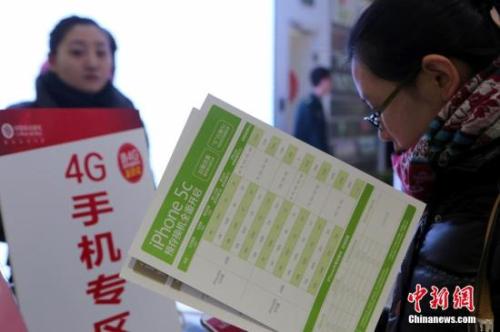Domestic roaming charges that have been paid for more than 20 years will be cancelled. How much can you save?
BEIJING, Beijing, July 28 (Wu Tao) On the 27th, the three major operators announced that they would completely cancel the domestic long-distance roaming charges for mobile phones from September 1. This means that domestic roaming charges for mobile phones that have been implemented in China for more than 20 years will become history. Who will benefit after cancellation? What impact will it have on operators’ operations? Zhongxin. com interviewed relevant experts for this purpose.

Long-distance roaming charges for domestic mobile phones will be cancelled after more than 2 years.
On July 27th, Yang Jie, Chairman of China Telecom, announced at the 9th "Tianyi Intelligent Ecology Expo" that from September 1st, China Telecom will completely cancel the domestic long-distance roaming charges for mobile phones, which is one month ahead of the plan at the beginning of the year, and it is expected to benefit 80 million users.
Subsequently, China Unicom and China Mobile announced that they would completely cancel the domestic long-distance roaming charges for mobile phones from September 1st, which was implemented one month earlier than originally planned on October 1st. On March 6 this year, three basic telecommunications companies said that they would officially cancel the long-distance roaming charges for domestic mobile phones from October 1.
The reporter checked the information and found that roaming charges can be traced back to the 1990 s and have already been generated during the mobile phone period. In 1990s, China set up a "roaming fee" similar to tariff for mobile phones used across regions.
This year, the three major operators have already begun to cancel the long-distance roaming charges of domestic mobile phones in advance. On July 25, Zhang Feng, spokesperson and chief engineer of the Ministry of Industry and Information Technology, said that regarding the cancellation of domestic long-distance roaming charges for mobile phones, the Ministry of Industry and Information Technology continued to push the three basic telecommunications companies to speed up their work in accordance with the principle of ensuring that the work is in place and striving for early implementation. "The three companies are making every effort to promote system transformation and other related work, and strive to achieve their goals ahead of schedule."
The reporter noted that the official plan to cancel the domestic roaming fee for mobile phones began in 2015. On July 6, 2015, the relevant person in charge of the Ministry of Industry and Information Technology said at the press conference on "speeding up and reducing fees" that "the Ministry of Industry and Information Technology is currently studying and exploring the possibility of canceling roaming charges."

What is the impact on ordinary consumers?
According to the data of the Ministry of Industry and Information Technology, by the end of June 2017, the total number of mobile phone users in China reached 1.36 billion. Who will be affected by the cancellation of domestic long-distance roaming charges by the three major operators? Will the user’s phone bill drop?
Xiang Ligang, an expert in communication industry, said in an interview with Zhongxin. com that the users who really benefit from it are mainly some old users, and the impact on ordinary consumers is actually very small.
"There are two main reasons: First, many new packages sold by the three major operators are ‘ Long-term market integration ’ (Long-distance, local calls and roaming are the same price), and these packages do not care about long-distance roaming; Second, for a period of time, a large number of users are converted into 4G users at high speed, that is, from old users to new package users. " Xiang Ligang said.
There are data to support this view. According to the latest data from the Ministry of Industry and Information Technology, in the first half of this year, 2G and 3G users continued to switch to 4G users, and 4G users maintained steady growth, with a cumulative net increase of 118 million, reaching 888 million, accounting for 65.1% of mobile phone users.
Ma Jihua, an analyst in the telecommunications industry, analyzed in an interview with Zhongxin.com, "There is one kind of users who will benefit, that is, users who use local packages may spend less in the future, but they will not get much light, because the reason why they use local packages is because the demand for long-distance roaming is not great."

What is the impact on the three major operators?
What impact will this policy have on the three major operators after its implementation? Will its income decline? According to Xiang Ligang’s analysis, the impact is very small. Long-distance roaming charges are originally a management tool of the three major operators. Now, the voice business income of the three major operators is shrinking, and the proportion of total revenue is also decreasing. Therefore, the cancellation of long-distance roaming charges has little impact on the income of the three major operators.
Ma Jihua holds the same view. He believes that although the policy will have a little impact on the income of the three major operators, it is not too big. "The three major operators can fully withstand it, and the voice services of the three major operators have also continued to decline. In the future, the income will mainly depend on traffic."
According to the data of the Ministry of Industry and Information Technology, from January to April this year, the voice business income of the three major operators accounted for 19.6% of the telecom business income. By the middle of the year, that is, from January to June, the proportion dropped to 19.4%, down 7.1 percentage points from the same period of the previous year.
Contrary to this, the traffic revenue of the three major operators is growing rapidly. In the first half of the year, the revenue of mobile data and mobile Internet services of the three major operators reached 274.6 billion yuan, up 29.6% year-on-year, accounting for 42.6% of the revenue of telecom services, driving the revenue of telecom services to increase by 10.3 percentage points.